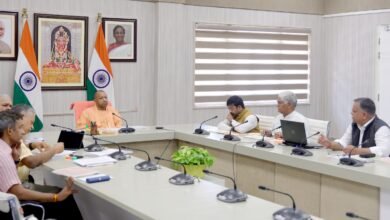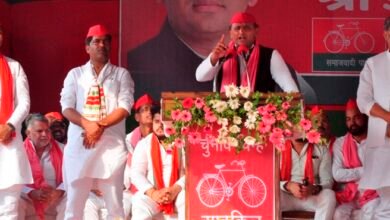Adoption of G20 DWG Action Plan

Adoption of G20 DWG Action Plan
The millennia-old holy city of Varanasi witnessed the ‘Adoption of G20 DWG Action Plan on Accelerating Progress on SDGs & High-Level Principles on Lifestyles for Sustainable Development’ during the three-day G20 Development Ministers’ Meeting (DMM) held from June 11 to 13, 2023.
The adoption of the G20 2023 Action Plan on Accelerating Progress on the SDGs and High-Level Principles on Lifestyles for Sustainable Development by development ministers and heads of departments at the Varanasi Development Ministers’ Meeting (DMM) was a moment of triumph for India.
While the Action Plan—by focusing on targeted actions in key transformative areas such as Gender Equality and Empowerment of Women, Digital Transformation, Data for Development and Globally Just Transitions—aims to provide the much-needed momentum to achieve the 2030 Agenda and the SDGs, the High-Level Principles on Lifestyles for Sustainable Development will bolster the global fight against climate change by advancing India’s message of Lifestyle for Environment (LiFE) through the promotion of sustainable and environmentally conscious lifestyle and choices.
Gender equality is a fundamental human right and empowering all women and girls to realize their full potential is not only key to achieving the 2030 Agenda and the Sustainable Development Goals (SDGs) but also for ensuring sustainable, inclusive and resilient development.
The Indian government has identified “nari shakti” as the harbinger of the country’s bright future and accordingly taken several steps to provide women with a life of dignity as a fundamental promise of governance. Initiatives such as the Beti Bachao, Beti Padhao, Swachh Bharat Abhiyaan, Mission Poshan, Ujjwala Yojana, Jal Jeevan Mission, Sukanya Samriddhi Yojana, and game-changing Pradhan Mantri Jan Dhan Yojana have transformed the lives of Indian women by enabling them to actively participate in the development process.
Thanks to India’s visionary leadership, steadfast commitment and unwavering dedication to sustainable global progress, we have effectively championed the need for women-led development on the G20 platform, setting an extraordinary precedent and initiating tangible actions for building a more inclusive and prosperous future.
As the G20 President, India has sought to change the growth narrative from the development of women to women-led development. Founded on the principles of women’s empowerment and gender equality, women-led development calls for a paradigm shift in the role of women from passive beneficiaries of development to active members of change.
The G20 Action Plan on Sustainable Development through Gender Equality and Women’s Empowerment focuses on 4 thematic areas—economic and social empowerment, bridging the gender digital divide, environment and climate action, and food security and nutrition—for achieving women’s full, equal, effective, and meaningful participation as active members of society, and decision makers for addressing global challenges effectively, decisively, and inclusively.
Data is another area that holds the key to effective policy-making, efficient resource allocation, and successful public service delivery. It pervades every aspect of our lives. However, countries are at different levels of development and readiness to engage with data-driven innovations.
Recognizing the indispensable and growing role of data, India has formulated the groundbreaking G20 Principles on Harnessing Data for Development to Accelerate Progress on the SDGs. These principles represent a unique and visionary approach to promote the utilization of data for development and building capacity in data.
To further these principles, India will launch the “Data for Development Capacity Building” initiative, which aims to enhance capacity and impart training to policymakers, officials, and other relevant stakeholders from developing nations. It will equip them with the necessary tools and knowledge to effectively implement the actions outlined in the work of the DWG on the G20 Principles on Data for Development.
This initiative is a testament to India’s unwavering commitment to drive global progress and foster inclusive development in the digital age.
Faced with the need to reinvigorate the spirit of multilateralism and take collective actions to meet both development and climate objectives and recognizing that transition pathways to global net zero have so far had high costs and risk premiums, India has promoted sustainable, inclusive and just transitions globally, while leaving no one behind.
Creating a stronger international enabling environment, which is proactive, adaptive, and responsive to the needs and priorities of all countries, is critical to make the multilateral system better suited to the challenges of the 21st century. The Indian Presidency has identified collective actions, including capacity building, technology, finance and policy coherence, to facilitate transitions, especially in developing countries.
India has played an instrumental role in shaping and advancing these high-level principles that will align the G20’s work with the 2030 Agenda, provide the necessary political momentum, and demonstrate India and the G20’s commitment to undertake actions that will accelerate progress towards the achievement of the SDGs. These principles will bring forward the specific needs, structural vulnerabilities and priorities of the developing countries; focus on creating a global enabling environment to achieve the SDGs, including through the reform of MDBs; and promote demand-driven and country-owned development cooperation models.
Other components of the Action Plan focus on efforts to address financing gaps for SDGs, coordination with other work streams of G20, and accountability and reporting.
The G20 High-Level Principles (HLPs) on Lifestyles for Sustainable Development, which builds on the Lifestyle for Environment (LiFE) initiative, seeks to foster a transformative change in the way we approach interlinked agendas related to development, climate and environment. Last year, Prime Minister Narendra Modi launched Mission LiFE, in the presence of the UN Secretary General António Guterres, in Gujarat. First proposed by the PM at COP 26, LiFE is an India-led global mass movement that seeks to nudge individual and collective action to protect and preserve the environment. Highlighting the importance of unity in the fight against climate change, the G20 High-Level Principles on Lifestyles for Sustainable Development emphasize the need for an integrated multi-level and multi-stakeholder approach looking at all aspects of sustainable development. While promoting sustainable consumption, the G20 HLPs on Lifestyles for Sustainable Development also focuses on comprehensive approaches that are pro-growth and enhance short-term and long-term sustainable productivity, and resource efficiency through multi-stakeholder collaborations, including through international partnerships. It encompasses all aspects of international response and efforts for achieving development, environment and climate goals via demand, supply and supporting policy framework. The HLPs are rooted in individual and community actions, while supporting a comprehensive and action-oriented approach that seeks to address all three dimensions of sustainable development—economic, social, and environmental—in a balanced and integrated manner to ensure last mile reach.
The adoption of these two documents was a remarkable achievement during our G20 presidency, which will no doubt go down in history as a significant step towards creating a more inclusive and transformative future.











